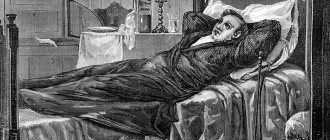Creative history of the novel
The novel “Oblomov” is part of Goncharov’s trilogy, which also consists of the novels “An Ordinary Story” and “The Precipice”, being its second part.
The idea for “Oblomov” originated with I.A. Goncharov in 1847. Initially, I.A. Goncharov thought of depicting in a novel called “Oblomovshchina” the story of a Russian noble landowner from cradle to grave, in his village and city life.
The novel was written over the course of twelve years, until 1859, when it was published in the journal Otechestvennye zapiski under the final title Oblomov.
In 1849, according to the author himself, a plan for the novel was drawn up and a draft of the first part was written. The idea of the novel arose from the writer under the influence of the ideas of V.G. Belinsky. The idea of this work was to depict those features of Russian national life and Russian national character that are becoming a thing of the past and are lost forever.
The author claimed that already in 1849 the outline of the novel and the draft of the first part were ready. The beginning of the novel was a depiction of the protagonist's upbringing in his father's house and his ordinary day there.
Work on “Oblomov” was suspended due to work on the book of essays “Frigate “Pallada” (1853 - 1855). In July-August 1857, in the German town of Marienbad, incredibly quickly, “as if by dictation,” Goncharov created the second and third parts, and in 1858 the last, fourth part was completed. But before the publication of the novel “Oblomov” it was thoroughly rewritten: new episodes were added, some chapters were shortened.
The earliest of all appeared in print as an independent work was the chapter “Oblomov’s Dream”: in 1847 in the magazine “Sovremennik”. Childhood memories of life in Simbirsk are reflected in this part, depicting the everyday existence and life of Russian landowners in the provinces, the foundations of patriarchal antiquity.
Not being able to devote all his time to literary activity (the writer served in the Department of Foreign Trade in St. Petersburg and made a brilliant career as an official), he nevertheless left behind a wonderful legacy, published in Russia and abroad and enjoying constant popularity - three novels starting with the letter “O”, including the above-mentioned novel.
Composition
The composition of the novel is circular. Four parts, four seasons, four states of Oblomov, four stages of life for each of us. The action in the book is a cycle: sleep turns into awakening, awakening into sleep.
Exposition. In the first part of the novel there is almost no action, except perhaps in Oblomov’s head. Ilya Ilyich is lying down, he is receiving visitors, he is shouting at Zakhar, and Zakhar is shouting at him. Various characters appear here, but at the core they are all the same... Like Volkov, for example, with whom the hero sympathizes and is happy for himself that he does not fragment and scatter into ten places in one day, does not confine himself, but maintains his human dignity in his chambers . The next one “out of the cold,” Sudbinsky, Ilya Ilyich also sincerely regrets and concludes that his unfortunate friend was bogged down in the service, and that now much in him will not move forever... There was the journalist Penkin, and the colorless Alekseev, and the thick-browed Tarantiev, and all he pitied equally, sympathized with everyone, retorted with everyone, recited ideas and thought... An important part is the chapter “Oblomov’s Dream”, in which the root of “Oblomovism” is exposed. The composition is equal to the idea: Goncharov describes and shows the reasons due to which laziness, apathy, infantility, and, in the end, a dead soul were formed. It is the first part that is the exposition of the novel, since here the reader is presented with all the conditions in which the hero’s personality was formed.
The beginning
. The first part is also the starting point for the subsequent degradation of Ilya Ilyich’s personality, for even the surges of passion for Olga and devoted love for Stolz in the second part of the novel do not make the hero better as a person, but only gradually squeeze Oblomov out of Oblomov. Here the hero meets Ilyinskaya, which in the third part develops into a climax.
Climax.
The third part, first of all, is fateful and significant for the main character himself, since here all his dreams suddenly become real: he accomplishes feats, he proposes marriage to Olga, he decides to love without fear, he decides to take risks, to fight with yourself... Only people like Oblomov don’t wear holsters, don’t fence, don’t sweat during battle, they doze and only imagine how heroically beautiful it is. Oblomov cannot do everything - he cannot fulfill Olga’s request and go to his village, since this village is a fiction. The hero breaks up with the woman of his dreams, choosing to preserve his own way of life rather than striving for better and eternal struggle with himself. At the same time, his financial affairs are hopelessly deteriorating, and he is forced to leave his comfortable apartment and prefer a budget option.
Denouement
. The fourth final part, the “Vyborg Oblomovism,” consists of a marriage with Agafya Pshenitsyna and the subsequent death of the main character. It is also possible that it was marriage that contributed to Oblomov’s dullness and imminent death, because, as he himself put it: “There are such donkeys that get married!”
The peculiarities of the composition lie in parallel storylines at different levels of perception.
There is only one main storyline here and it is love, romantic... The relationship between Olga Ilyinskaya and her main gentleman is shown in a new, bold, passionate, psychologically detailed way. That is why the novel claims to be a love novel, being a kind of example and manual for building relationships between a man and a woman.
The secondary storyline is based on the principle of contrasting two destinies: Oblomov and Stolz, and the intersection of these very destinies at the point of love for one passion. But in this case, Olga is not a turning point character, no, the gaze falls only on strong male friendship, on pats on the back, on wide smiles and on mutual envy (I want to live the way the other lives).
The final segment of the work
This part can be characterized as a combination of two seasons : autumn and winter. The hero again begins to live his usual life, only with Agafya Pshenitsyna. Before his end, the hero visits familiar places and indulges in dreams that can never come true. At the time of the hero’s physical departure, his soul had long left his mortal body. He did not live, but only existed in his usual oblivion.
Ultimately, it should be noted that the entire composition of the work shows the “circular nature” of the hero’s soul. Ilya Ilyich begins his journey in an imaginary country and ends his life with the same thoughts. Like the hero himself, his “Oblomovka” also dies. If you delve a little deeper into the text, you will see the philosophical thoughts of the author himself regarding the transience of any person’s life, his thoughts and actions on the subtly presented artistic features of the novel “Oblomov”.
What is the novel about?
This novel is, first of all, about the vice of social significance. Often the reader can notice Oblomov’s resemblance not only to his creator, but also to most people who live and have ever lived. Which of the readers, as they became closer to Oblomov, did not recognize themselves lying on the sofa and reflecting on the meaning of life, on the futility of existence, on the power of love, on happiness? Which reader has not crushed his heart with the question: “To be or not to be?”?
The quality of the writer, ultimately, is such that, while trying to expose yet another human flaw, he falls in love with it in the process and serves the reader with such an appetizing aroma that the reader impatiently wants to feast on it. After all, Oblomov is lazy, unkempt, and childish, but the public loves him only because the hero has a soul and he is not ashamed to reveal this soul to us. “Do you think that thoughts don’t require a heart? No, it is fertilized by love” - this is one of the most important postulates of the work that lays the essence of the novel “Oblomov”.
The sofa itself and Oblomov lying on it keep the world in balance. His philosophy, illegibility, confusion, throwing govern the lever of movement and the axis of the globe. In the novel, in this case, there is not only a justification for inaction, but also a desecration of action. The vanity of vanities of Tarantyev or Sudbinsky does not bring any sense, Stolz is successfully making a career, but what kind of career is unknown... Goncharov dares to slightly ridicule work, that is, work in the service, which he hated, which, therefore, was not surprising to notice in the character of the protagonist . “But how upset he was when he saw that there would have to be at least an earthquake in order for a healthy official not to come to work, and as luck would have it, earthquakes don’t happen in St. Petersburg; A flood, of course, could also serve as a barrier, but even that rarely happens.” — the writer conveys the complete meaninglessness of government activities. This is a novel about the fact that if you are lying on the couch, you are perhaps more right than those who walk somewhere or sit somewhere every day. Oblomovism is a diagnosis of humanity, where any activity can lead either to the loss of one’s own soul or to a senseless waste of time.
Semantic features of the composition “Oblomov”
In the novel "Oblomov" the composition is divided into four main parts, symbolizing the four stages of the hero's life, corresponding to the seasons. It is not surprising that the theme of nature in the novel occupies one of the central places - all events seem to be complemented by landscapes, weather or images of nature.
“Spring” and “Summer” by Oblomov
The novel begins with “winter” in Oblomov’s life - a state of half-asleep, almost “dying,” when a person practically does not get out of bed, waiting for his death. The next stage - the second part - is Ilya Ilyich’s “spring” - revival from “winter” sleep and steps towards a new life and new love. The borderline moment between the “winter” of the first part and the “spring” of the second is Oblomov’s dream, which tells about the actual “spring” of the hero’s life - his childhood in his native village. The functional role of sleep in the composition of the novel is a smooth transition from apathy and “winter” to “spring” through memories of youth, joy and life through a dream - that is, in fact, Oblomov’s dream is prophetic, since then his life again becomes similar to his youth - filled with the enchanting beauty of nature, new impressions and love. On the other hand, the arrival of the hero’s “spring” in a dream indicates that the following events are a continuation of this dream, and not actually happening to the hero. This is also indicated by Olga’s words during their separation that she is not able to change Oblomov, since he is already dead. That is, starting the novel with Oblomov’s “winter,” the author indicates that the hero is already irrevocably immersed in a sleepy state, leading to the collapse of “Oblomovism.”
The spring love of the heroes, symbolized by a fragile lilac branch, is replaced by “summer” (the third part of the novel) both in the hero’s soul and in the relationship between Olga and Oblomov. They think about the need to get married, but Oblomov’s lack of initiative and fear of the future prevents this from happening. The separation of the lovers represents the end of “summer”, emphasized by the snowfall that Oblomov falls into on his way home - as if a reminder that the hero had again fallen into a winter deathly sleep and apathy, from which only Olga and Stolz could bring him out.
“Autumn” and “Winter” by Oblomov
The fourth part of the novel represents the “autumn” and “winter” of Oblomov’s personality - the calm, deathly quiet life of Pshenitsyna. Before Ilya’s death, Ilyich seems to be returning to his native Oblomovka, while becoming more and more immersed in dreams that are not destined to come true. At the time of actual death, Oblomov’s personality was already dead - he had long existed outside the real world, immersed in the illusory world of “winter” half-asleep.
At the same time, the real calendar of events is somewhat shifted in relation to the development of events, which begin in May and end in late autumn, thus symbolizing the period of the hero’s life corresponding to his real age - from 30 years old (late spring) to late autumn - about 50 -thirty years old.
Themes
The theme of the novel “Oblomov” covers all spheres of life of the nobles of the 19th century:
Upbringing
– The writer emphasizes the importance of education. It shows how different children raised in different conditions can grow up. For comparison, it shows two extremes - strict parents and soft parents. In both cases, the results are too exaggerated and categorical: Andrey lacks sincerity to be happy, and Ilya lacks activity and practicality.
Childhood
– Childhood in the novel is depicted as an important stage in the construction of the human personality. Already in childhood, the heroes of the novel became who they are. However, they perceive it completely differently. For Stolz, childhood became a source of experience, and for Oblomov - a lost paradise and dream.
Love
– According to Goncharov, love is a wonderful feeling. It can truly change a person. However, at the same time, it can also cause terrible harm. Ilyinskaya is going through an unsuccessful romance, although not without consequences, and Oblomov withdraws even more into himself. Therefore, it is important to go to the end in a feeling, and if you change under its influence, then it changes irreversibly. Otherwise, an unsuccessful attempt at change will result in a broken heart and self-betrayal.
Dream
– A person who is able to dream is wonderful. However, Goncharov shows that those who live only in dreams are doomed to tragedy in real life. Ilya Ilyich and his “crystal soul” are not adapted to independent existence and condemn everyone around them to the need for sacrifice in the name of their salvation.
Friendship
– Goncharov depicted a rather rare phenomenon in Russian literature – true friendship. Stolz and Oblomov, being complete opposites, are always ready to help each other. They complement themselves through communication with a friend and discover for themselves that inaccessible thing that is separated from themselves.
Oblomov's happiness lay in the memories of a long-gone childhood, in which he was fenced off from the bustle of the real world. Security, abundance and comfort are his elements. Ilya Ilyich’s ideal was an infantile and well-fed life in grand style, unencumbered by work.
Work
– Goncharov endlessly respects a working person who has achieved success on his own. However, using the example of Stolz, he demonstrates that such a person can go to extremes, turn into a reliable but stereotyped mechanism that perceives life only from the point of view of work for the sake of work itself.
Main theme: The writer in the novel raises the following questions:
- Childhood. In the work it is shown as an important stage in the structure of a person’s personality. Already at this time, the heroes became the people they are. But they perceive it completely differently. For Oblomov, childhood is a lost paradise, for Stolz it is a source of experience.
- Upbringing. The author showed how different children grow up when brought up in different conditions.
- Dream. Goncharov says that a person who lives only by dreams is doomed to misfortune in later life. Oblomov is not adapted to existence and condemns those around him to sacrifice for the sake of his salvation.
- Work. The writer glorifies working people who themselves were able to achieve success. But using the example of Stolz, he shows that this person can have extremes, he turns into a reliable but stereotyped mechanism, perceiving life only from the point of view of work.
- Love. According to the writer, this is the most wonderful feeling that can actually change a person. But at the same time, love sometimes causes harm. Ilyinskaya worries about the failed wedding, but this happens without consequences, while Oblomov withdraws even more into himself.
Problems
Extra person
– Goncharov portrayed the image of a man who, due to his lordly upbringing, turns out to be unable to live in the real world. Through the image of Oblomov, the writer demonstrated the degradation of the landowner nobility, unable to adapt to changes in everyday life and morals. For better or worse, society cannot forever contain parasites like Ilya Ilyich, despite their crystal soul. Therefore, its position as atavism, which is gradually becoming a thing of the past, seems quite logical.
Oblomovism
– By this word, Goncharov meant a way of thinking in which a person, abandoning the present, plunges into idealistic memories of the past. He neither creates nor destroys, but simply contemplates the gallery of memories. Oblomovism is a refusal to act, inevitably ending in the death of the soul.
Oblomov's lifestyle
– The writer to a certain extent sympathizes with his hero, showing his moral superiority over the soullessness and fussiness of those around him, but Goncharov demonstrates that Oblomov’s lifestyle is destructive not only for him, but also for those who depend on him. His son was left an orphan due to his father's immaturity.
Meaning of life
– The writer shows us two extremes. On the one hand, we see Oblomov, who devoted his entire life to lazy reasoning and thoughts, and on the other hand, Stolz, for whom nothing exists in this life except work. Neither Oblomov nor Stolz ever found true happiness and meaning in life. Goncharov showed the futility of two extremes of life
Reasons for Oblomov's lying down
– Goncharov showed the imperfection of noble education and society, which ultimately gave rise to a layer of people not adapted to any human activity. It was the master who found his place on the sofa, because only his life did not force him to work. He was born with a silver spoon in his mouth and did not have enough motivation to find his place in the sun. Why, if everything is already there? Oblomov could have appeared in society and squandered money there, like most of his noble peers, but by nature he was a closed and apathetic person without interests. Only dreams and thoughts occupied him, and therefore his way of thinking and origin came together at one point - on the sofa.
Laziness
is shown in the novel as the most dangerous human vice, which leads a person first to spiritual and then physical death.
main idea
Goncharov depicted in the novel the withering away of old Russia and the beginning of a new era, this is the social meaning of the novel “Oblomov”:
On the one hand, we see the landowner nobility, represented by Oblomov, in a deep ideological crisis, powerless and indifferent to everything.
On the other hand, we can observe a new generation of Russian people in the person of Stolz - hardworking, talented capitalists, businessmen who live only by working and making money.
The author's main idea is the hope that Russia will be able to draw only the best from both worlds.
the main idea
The author described in the work the withering away of the old system and the beginning of a new era. This is the main idea. The reader sees the nobility in the image of Oblomov, which is in a deep ideological crisis, weak and indifferent to everything. But at the same time, one can see a new generation in Stolz’s description - hard-working, talented capitalists, entrepreneurs who live only by work and making profit.
Goncharov's main idea is the hope that Russia will select the best for itself from the two extremes. The work teaches that a person must work honestly to achieve something in life, and not just think about the meaning of existence. But at the same time, he should not pacify his philanthropy. Because only by thinking about the world around us and one’s own life, giving in to nostalgia, thoughts, and dreams, can a person be truly happy. This conclusion suggests itself after reading the novel “Oblomov”.
Examples of similar educational works
Oblomov's test of love in the novel
... calmness, which is what I wanted. Examples of work Before writing an essay, it is necessary to familiarize yourself with the summary of the novel so that ... the ideal of escapism is instilled in him. Oblomov was especially tormented in the presence of his friend Stolz. Andrey …
Why didn’t Olga Ilyinskaya manage to “resurrect” Oblomov? based on the novel by I. A. Goncharov...
... Olga and devoted love for Stolz in the second part of the novel do not make the hero better as a person, but only gradually squeeze Oblomov out of Oblomov. Here the hero meets Ilyinskaya, ... through his eyes. There’s a profit on Ilyinskaya... – Zakhar hasn’t finished speaking yet, but...
What is the tragedy of Oblomov’s life? (based on the novel “Oblomov” by I.A. Goncharov)
… ► Go to the table of contents of the book “Oblomov” by I.A. Goncharova. Summary. Features of the novel. Works ► Reasons for the appearance of “Oblomovism” I. A. Goncharov became famous with the publication of the novel “An Ordinary History” in 1847 ...
Oblomov’s apartment and office in the novel “Oblomov”: description of the interior, rooms and sofa
...incredible transformations happened to him - his greasy robe was abandoned, Oblomov gets out of bed as soon as he wakes up, reads books, newspapers, ... and the living. Also, for only a few moments we see Ilyinskaya’s house, and like a mistress, he is strict and without excesses: ...
Oblomov and Stolz comparison of heroes reasoning
... and weaknesses. For some, the hero is Oblomov, for others it is Stolz. Oblomov and Stolz are friends of Ivan Goncharov, who created a similar romance with two... in his soul. Everyone is fussing somewhere, striving for certain actions, thinking about how to live tomorrow...
What does it teach?
The novel "Oblomov" teaches us to avoid extremes. A person must work honestly to achieve something in this life, and not just talk about the meaning of life. However, at the same time, he should not suppress his humanity. After all, only by talking about our life and the world around us, dreaming, thinking, giving in to nostalgia, can we perhaps become truly happy. This conclusion can be drawn from the novel “Oblomov”.
Goncharov showed that even completely different people can become true friends, and even the most tender love can lead to trouble. This is the moral of the work “Oblomov”: there is nothing absolutely good and bad, true and false. Olga’s good intentions turned into trauma for both Ilya and herself. Andrei's concern for his friend only pushed him to even greater degradation.





